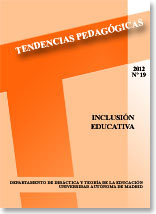ESSENTIAL COMPETENCES IN THE INITIAL TRAINING OF AN INCLUSIVE TEACHER. A PROJECT OF THE EUROPEAN AGENCY FOR THE DEVELOPMENT OF EDUCATIONAL NEEDS SPECIALS
Keywords:
Initial teacher education, competences, inclusive education, values, believes.Abstract
This paper explain the objectives and some outputs of European Agency for Development in Special Needs Education project, Teacher Education for Inclusion (TE4I), that has explored how all teachers must be prepared via their initial training to be ‘inclusive’. The three year project set out to identify the essential skills, knowledge and understanding, attitudes and values needed by everyone entering the teaching profession, regardless of the subject, specialism or age range they will teach or the type of school they will work in. One output of this project is the Profile of Inclusive Teachers. Core values, believes and areas of competence regarding this profile are describe an analyzedDownloads
References
Avramidis, E., Bayliss, P. & Burden, R. (2000) A survey into mainstream teachers’ attitudes towards the inclusion of children with special educational needs in the ordinaryclassroom in one local educational authority, Educational Psychology, 20 (2), 191-211
Booth (2006). Manteniendo el futuro con vida; convirtiendo los valores de la inclusión en acciones. En M.A. Verdugo & F.B. Jordán de Urríes (Coords.), Rompiendo inercias. Claves para avanzar. VI Jornadas
Científicas de Investigación sobre Personas con Discapacidad (pp. 211-217). Salamanca: Amarú.
Booth, T. & Ainscow. M. (2011).Index for Inclusion. 3th ed.; developing learninga and participation in schools. Bristorl: CSIE
Casnova, M.A. (2011) Educación inclusiva. Un modelo de futuro. Madrid: Wolters Kluve
Echeita, G. (2008) Inclusión y exclusión educativa. “Voz y quebranto”. REICE - Revista Electrónica Iberoamericana sobre Calidad, Eficacia y Cambio en Educación 2008, 6 (2), 9-18, consultado el 6/09/10
Echeita, G. y Ainscow, M. (2011) La educación inclusiva como derecho. Marco de referencia y pautas de acción para el desarrollo de una revolución pendiente Tejuelo. Didáctica de la Lengua y la Literatura. Educación, 12, 26-46
Escudero, J, M. y Martínez, B. (2011) Educación inclusiva y cambio escolar. Revista Iberoamericana de Educación, 55,85-105
Florian, L. & Rouse, M. (2009) The inclusive practice project in Scotland: Teacher education for inclusive education. Teaching and Teacher Education, 25 (4), 594-601
Florian, L. & Linklater, H. (2010) Preparing teachers for inclusive education: using inclusive pedagogy to enhance teaching and learning for all, Cambridge Joumal of Education, 40 (4), 369-386
Golder, G., Norwich, B. & Bayliss, P. (2005) Preparing teachers to teach pupils with special educational needs in more inclusive schools: evaluating a PGCE development. British Journal of Special Education,
(2), 92-99
Hart, S., Dixon, A., Orummond, M,J., & Mclntyre, O.(2004). Learning without !imils. Maidenhead: Open Uníversity Press
Lambe, J. (2007) Student teachers, special educational needs and inclusion education: reviewing the potential for problem-based, e-learning pedagogy to support practice.Journal of Education for Teaching, 33 (3),
-377
Lancaster, J. & Bain, A. (2007) The Design of Inclusive Education Courses and The Self-Efficacy of Preservice Teacher Education Students. International Journal of Disability,Development and Education, 54 (2), 245-256
López, M., Echeita, G. y Martín, E. (2009). Concepciones sobre el proceso de inclusión educativa de alumnos con discapacidad intelectual en la educación secundaria obligatoria. Cultura y Educación, 21, 485-496.
Loreman, T. & Earle, C. (2007) The development of attitudes, sentiments and concerns about inclusive education in a content-infused Canadian teacher preparation program. Exceptionality Education Canada, 17 (1),85-106
Pearson, S. (2007) Exploring inclusive education: early steps for prospective secondaryschool teachers. British Journal of Special Education, 34 (1), 25-32
Pugach, M. & Blanton, L. (2009) A framework for conducting research on collaborative teacher education. Teaching and Teacher Education, 25 (4), 575-582
Urbina, C., Simón, C. y Echeita, G. (2011) Concepciones de los profesores acerca de las conductas disruptivas: análisis a partir de un marco inclusivo. Infancia y Aprendizaje, 34 (2), 205-217.
Van Laarhoven, T., Munk, D., Lynch, K., Wyland, S., Dorsh, N., Zurita, L., Bosma, J. & Rouse, J. (2006) Project ACCEPT: Preparing pre-service special and general educators for inclusive education. Teacher Education and Special Education, 29 (4), 209-212
Van Laarhoven, T., Munk, D., Lynch, K., Bosma, J. & Rouse, J. (2007) A model for preparing special and general education pre-service teachers for inclusive education. Journal of Teacher Education, 58 (5), 440-455
Voltz, D. L. (2003) Collaborative infusion: An emerging approach to teacher preparation forinclusive education. Action in Teacher Education, 25 (1), 5-13
Woloshyn, V., Bennett, S. & Berrill, D. (2003) Working with students who have learning disabilities – teacher candidates speak out: Issues and concerns in pre-service education and professional development.
Exceptionality Education Canada, 13 (1), 7-28
